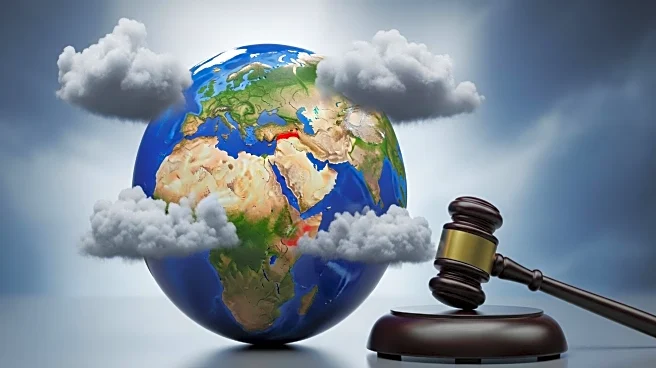What's Happening?
The United Nations is set to reimpose sanctions on Iran over its nuclear program, escalating tensions in the Middle East. This decision follows the failure of diplomatic efforts by Iranian President Masoud Pezeshkian and Foreign Minister Abbas Araghchi to prevent the sanctions. The sanctions, known as 'snapback' sanctions, will be reinstated due to Iran's non-compliance with the 2015 nuclear deal, as declared by France, Germany, and the United Kingdom. The sanctions will freeze Iranian assets abroad, halt arms deals, and penalize Iran's ballistic missile program. This move comes amid heightened tensions following a 12-day war between Israel and Iran, during which the U.S. and Israel targeted Iranian nuclear sites.
Why It's Important?
The reimposition of sanctions on Iran is significant as it could further destabilize the already volatile Middle East region. The sanctions are likely to impact Iran's economy, which is already under pressure, and could close diplomatic avenues for resolving nuclear tensions. The decision also highlights the strained relations between Iran and Western countries, particularly the U.S., following the U.S.'s withdrawal from the nuclear deal in 2018 under President Trump's administration. The sanctions could affect global oil markets, given Iran's role as a major oil producer, and may influence geopolitical alliances, with countries like China and Russia opposing the sanctions.
What's Next?
The sanctions are expected to take effect soon, potentially leading to further economic challenges for Iran. The international community will be watching closely to see how Iran responds, particularly whether it will escalate its nuclear activities or seek new diplomatic engagements. The situation may also prompt reactions from other global powers, such as China and Russia, who have historically supported Iran. The reimposition of sanctions could also influence U.S. foreign policy and its approach to the Middle East, especially in the context of the ongoing Israel-Hamas conflict.
Beyond the Headlines
The reimposition of sanctions raises questions about the effectiveness of international agreements and the role of diplomacy in resolving nuclear proliferation issues. It also underscores the complexities of Middle Eastern geopolitics, where historical grievances and alliances play a significant role. The situation could lead to a reassessment of nuclear non-proliferation strategies and the role of international bodies like the UN in enforcing compliance. Additionally, the sanctions may have humanitarian implications for the Iranian population, potentially exacerbating economic hardships and affecting public sentiment towards the West.










